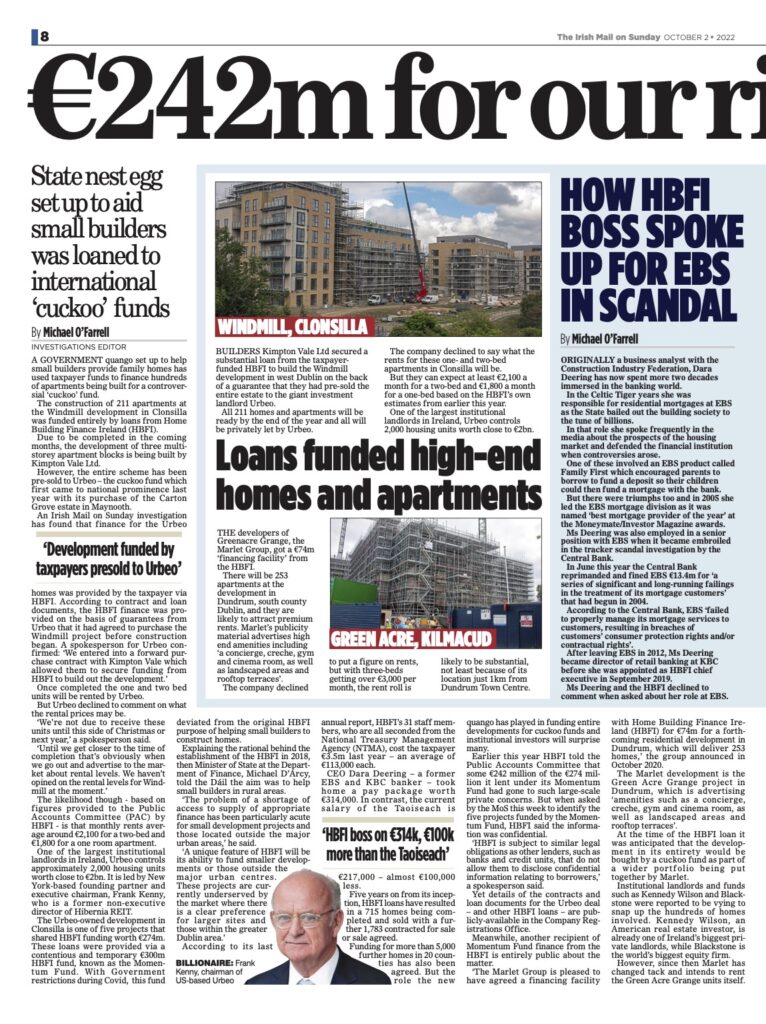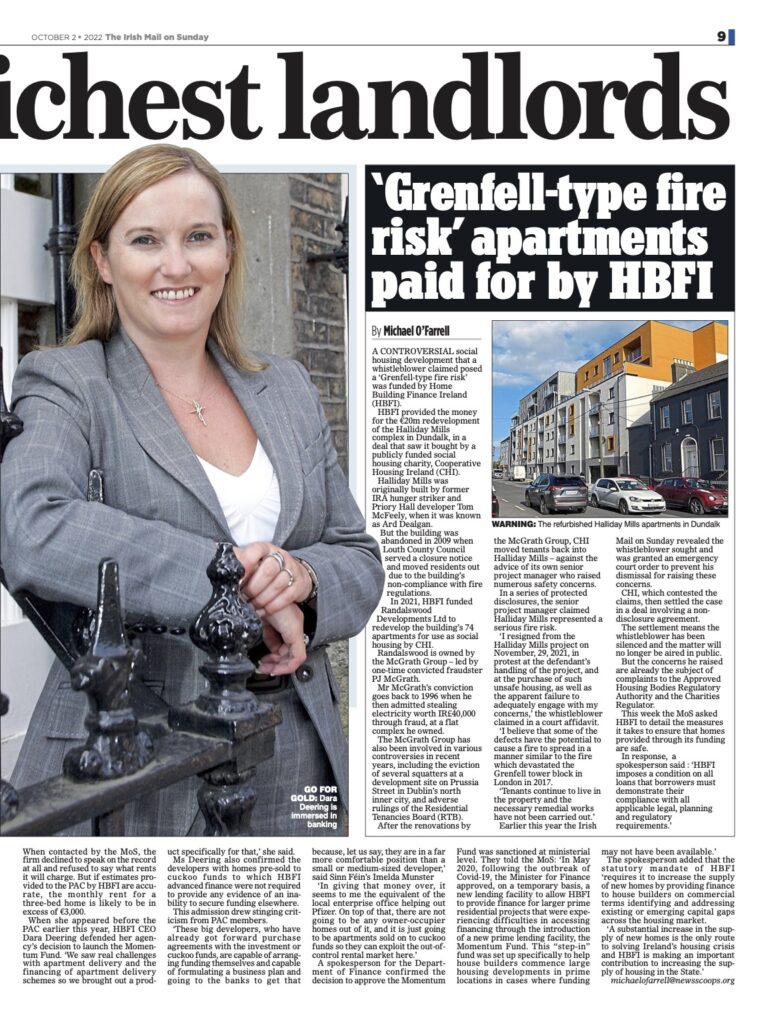A GOVERNMENT quango set up to help small builders provide family homes has used taxpayer funds to finance hundreds of apartments being built for a controversial ‘cuckoo’ fund.
The construction of 211 apartments at the Windmill development in Clonsilla was funded entirely by loans from Home Building Finance Ireland (HBFI).
Due to be completed in the coming months, the development of three multistorey apartment blocks is being built by Kimpton Vale Ltd.
However, the entire scheme has been pre-sold to Urbeo – the cuckoo fund which first came to national prominence last year with its purchase of the Carton Grove estate in Maynooth.
An Irish Mail on Sunday investigation has found that finance for the Urbeo homes was provided by the taxpayer via HBFI.
According to contract and loan documents, the HBFI finance was provided on the basis of guarantees from Urbeo that it had agreed to purchase the Windmill project before construction began.
A spokesperson for Urbeo confirmed: ‘We entered into a forward purchase contract with Kimpton Vale which allowed them to secure funding from HBFI to build out the development.’
If you know of information relating to this public interest topic please contact michaelofarrell@protonmail.com in complete confidence.


Once completed the one and two bed units will be rented by Urbeo.But Urbeo declined to comment on what the rental prices may be.
‘We’re not due to receive these units until this side of Christmas or next year,’ a spokesperson said.
‘Until we get closer to the time of completion that’s obviously when we go out and advertise to the market about rental levels. We haven’t opined on the rental levels for Windmill at the moment.’
The likelihood though – based on figures provided to the Public Accounts Committee (PAC) by HBFI – is that monthly rents average around €2,100 for a two-bed and €1,800 for a one room apartment.
One of the largest institutional landlords in Ireland, Urbeo controls approximately 2,000 housing units worth close to €2bn.
It is led by New York-based founding partner and executive chairman, Frank Kenny, who is a former non-executive director of Hibernia REIT.
‘In giving that money over, it seems to me the equivalent of the local enterprise office helping out Pfizer.’
Imelda Munster – Sinn Fein.
The Urbeo-owned development in Clonsilla is one of five projects that shared HBFI funding worth €274m.
These loans were provided via a contentious and temporary €300m HBFI fund, known as the Momentum Fund.
With Government restrictions during Covid, this fund deviated from the original HBFI purpose of helping small builders to construct homes.
Explaining the rational behind the establishment of the HBFI in 2018, then Minister of State at the Department of Finance, Michael D’Arcy, told the Dáil the aim was to help small builders in rural areas.
‘The problem of a shortage of access to supply of appropriate finance has been particularly acute for small development projects and those located outside the major urban areas,’ he said.
‘A unique feature of HBFI will be its ability to fund smaller developments or those outside the major urban centres.
These projects are currently underserved by the market where there is a clear preference for larger sites and those within the greater Dublin area.’
According to its last annual report, HBFI’s 31 staff members, who are all seconded from the National Treasury Management Agency (NTMA), cost the taxpayer €3.5m last year – an average of €113,000 each.
CEO Dara Deering – a former EBS and KBC banker – took home a pay package worth €314,000. In contrast, the current salary of the Taoiseach is €217,000 – almost €100,000 less.
Five years on from its inception, HBFI loans have resulted in a 715 homes being completed and sold with a further 1,783 contracted for sale or sale agreed.
Funding for more than 5,000 further homes in 20 counties has also been agreed. But the role the new quango has played in funding entire developments for cuckoo funds and institutional investors will surprise many.
Earlier this year HBFI told the Public Accounts Committee that some €242 million of the €274 million it lent under its Momentum Fund had gone to such large-scale private concerns. But when asked by the MoS this week to identify the five projects funded by the Momentum Fund, HBFI said the information was confidential.
‘HBFI is subject to similar legal obligations as other lenders, such as banks and credit units, that do not allow them to disclose confidential information relating to borrowers,’ a spokesperson said.
Yet details of the contracts and loan documents for the Urbeo deal – and other HBFI loans – are publicly-available in the Company Registrations Office.
Meanwhile, another recipient of Momentum Fund finance from the HBFI is entirely public about the matter.
‘The Marlet Group is pleased to have agreed a financing facility with Home Building Finance Ireland (HBFI) for €74m for a forthcoming residential development in Dundrum, which will deliver 253 homes,’ the group announced in October 2020.
The Marlet development is the Green Acre Grange project in Dundrum, which is advertising ‘amenities such as a concierge, creche, gym and cinema room, as well as landscaped areas and rooftop terraces’.
At the time of the HBFI loan it was anticipated that the development in its entirety would be bought by a cuckoo fund as part of a wider portfolio being put together by Marlet.
Institutional landlords and funds such as Kennedy Wilson and Blackstone were reported to be vying to snap up the hundreds of homes involved.
‘A substantial increase in the supply of new homes is the only route to solving Ireland’s housing crisis’
Department of Finance Spokesperson.
Kennedy Wilson, an American real estate investor, is already one of Ireland’s biggest private landlords, while Blackstone is the world’s biggest equity firm.
However, since then Marlet has changed tack and intends to rent the Green Acre Grange units itself.
When contacted by the MoS, the firm declined to speak on the record at all and refused to say what rents it will charge. But if estimates provided to the PAC by HBFI are accurate, the monthly rent for a three-bed home is likely to be in excess of €3,000.
When she appeared before the PAC earlier this year, HBFI CEO Dara Deering defended her agency’s decision to launch the Momentum Fund.
‘We saw real challenges with apartment delivery and the financing of apartment delivery schemes so we brought out a product specifically for that,’ she said.
Ms Deering also confirmed the developers with homes pre-sold to cuckoo funds to which HBFI advanced finance were not required to provide any evidence of an inability to secure funding elsewhere.
This admission drew stinging criticism from PAC members.
‘These big developers, who have already got forward purchase agreements with the investment or cuckoo funds, are capable of arranging funding themselves and capable of formulating a business plan and going to the banks to get that because, let us say, they are in a far more comfortable position than a small or medium-sized developer,’ said Sinn Féin’s Imelda Munster
‘In giving that money over, it seems to me the equivalent of the local enterprise office helping out Pfizer. On top of that, there are not going to be any owner-occupier homes out of it, and it is just going to be apartments sold on to cuckoo funds so they can exploit the out-ofcontrol rental market here.’
A spokesperson for the Department of Finance confirmed the decision to approve the Momentum Fund was sanctioned at ministerial level.
They told the MoS: ‘In May 2020, following the outbreak of Covid-19, the Minister for Finance approved, on a temporary basis, a new lending facility to allow HBFI to provide finance for larger prime residential projects that were experiencing difficulties in accessing financing through the introduction of a new prime lending facility, the Momentum Fund.
This “step-in” fund was set up specifically to help house builders commence large housing developments in prime locations in cases where funding may not have been available.’
The spokesperson added that the statutory mandate of HBFI ‘requires it to increase the supply of new homes by providing finance to house builders on commercial terms identifying and addressing existing or emerging capital gaps across the housing market.
‘A substantial increase in the supply of new homes is the only route to solving Ireland’s housing crisis and HBFI is making an important contribution to increasing the supply of housing in the State.’
‘Grenfell-type fire risk’ apartments paid for by HBFI
A CONTROVERSIAL social housing development that a whistleblower claimed posed a ‘Grenfell-type fire risk’ was funded by Home Building Finance Ireland (HBFI).
HBFI provided the money for the €20m redevelopment of the Halliday Mills complex in Dundalk, in a deal that saw it bought by a publicly funded social housing charity, Cooperative Housing Ireland (CHI).
Halliday Mills was originally built by former IRA hunger striker and Priory Hall developer Tom McFeely, when it was known as Ard Dealgan.
But the building was abandoned in 2009 when Louth County Council served a closure notice and moved residents out due to the building’s non-compliance with fire regulations.
In 2021, HBFI funded Randalswood Developments Ltd to redevelop the building’s 74 apartments for use as social housing by CHI.
Randalswood is owned by the McGrath Group – led by one-time convicted fraudster PJ McGrath.
Mr McGrath’s conviction goes back to 1996 when he then admitted stealing electricity worth IR£40,000 through fraud, at a flat complex he owned.
I believe that some of the defects have the potential to cause a fire to spread in a manner similar to the fire which devastated the Grenfell tower block in London in 2017.
CHI Whistleblower
The McGrath Group has also been involved in various controversies in recent years, including the eviction of several squatters at a development site on Prussia Street in Dublin’s north inner city, and adverse rulings of the Residential Tenancies Board (RTB).
After the renovations by the McGrath Group, CHI moved tenants back into Halliday Mills – against the advice of its own senior project manager who raised numerous safety concerns.
In a series of protected disclosures, the senior project manager claimed Halliday Mills represented a serious fire risk.
‘I resigned from the Halliday Mills project on November, 29, 2021, in protest at the defendant’s handling of the project, and at the purchase of such unsafe housing, as well as the apparent failure to adequately engage with my concerns,’ the whistleblower claimed in a court affidavit.
‘I believe that some of the defects have the potential to cause a fire to spread in a manner similar to the fire which devastated the Grenfell tower block in London in 2017.
Borrowers must demonstrate their compliance with all applicable legal, planning and regulatory requirements.
HBFI Spokesperson.
‘Tenants continue to live in the property and the necessary remedial works have not been carried out.’
Earlier this year the Irish Mail on Sunday revealed the whistleblower sought and was granted an emergency court order to prevent his dismissal for raising these concerns.
CHI, which contested the claims, then settled the case in a deal involving a nondisclosure agreement.
The settlement means the whistleblower has been silenced and the matter will no longer be aired in public.
But the concerns he raised are already the subject of complaints to the Approved Housing Bodies Regulatory Authority and the Charities Regulator.
This week the MoS asked HBFI to detail the measures it takes to ensure that homes provided through its funding are safe.
In response, a spokesperson said : ‘HBFI imposes a condition on all loans that borrowers must demonstrate their compliance with all applicable legal, planning and regulatory requirements.’
Officials were warned of bad optics of public cash for cuckoo fund homes
THE Government was warned about the ‘reputational impact’ of using taxpayers’ money to finance buy-to-let homes owned by ‘cuckoo funds’ – but still went with the controversial scheme, an Irish Mail on Sunday investigation reveals.
The establishment of Home Building Finance Ireland – a quango announced by Finance Minister Paschal Donohoe in his 2018 budget speech – was aimed at helping small builders to provide family homes throughout the country.
With a taxpayer fund of €750m and an additional startup cost of €20m, HBFI’s assigned role was to lend to small builders who could not get finance elsewhere.
There may be a perception that HBFI is supporting larger developers at the expense of smaller developers
A cap of €35m was placed on any loans to small builders. But in a surprise change of policy in 2020, a €300m slice of the HBFI’s available finance was temporarily diverted into a sub fund called the Momentum Fund.
Instead of being offered to small home builders, the Momentum Fund made finance available for large apartment developments being built for cuckoo funds or institutional owners.
Most of these homes will not be available to the general public to buy once they come on stream and will be out of reach for many renters.
In order to facilitate larger developers, the original €35m cap was lifted and Momentum Fund applicants were ultimately able to borrow as much as €90m to complete apartment projects for cuckoo funds.
The Government agreed this move, despite a Department of Finance report in 2019 that warned cuckoo funds were unlikely to increase the supply of affordable housing and could instead develop ‘monopolistic power’.
Further warnings in a KPMG report commissioned by HBFI into the proposed Momentum Fund were also set aside.
‘There may be a perception that HBFI is supporting larger developers at the expense of smaller developers,’ reads the 2020 KPMG report, obtained by the MoS.
It also warned of the ‘reputational impact’ HBFI may suffer in funding cuckoo funds.
In June 2020 the board of HBFI considered this risk but ultimately accepted the KPMG recommendation that the Momentum Fund proceed to be made available to PRS (Private Rented Sector) schemes.
‘From HBFI’s perspective the PRS model makes a large number of units available in a relatively short period and therefore is in keeping with HBFI’s remit,’ the board minutes read.
‘Furthermore, most apartment schemes being built are PRS given that the construction of apartments for private sale is generally not commercially viable.’
In order to minimise the risk of reputational damage, the HBFI board agreed it ‘must ensure that it can continue to fund its core products so that funding continues to be available for all viable schemes’.
Planning rules allowing ‘build-to-rent’ apartments are to be abolished. Housing Minister Darragh O’Brien told the Fianna Fáil Árd Fheis yesterday that from the end of the year, every apartment application ‘will be a single, build-tobuy standard and allowed to be sold, not restricted for rental’.
HBFI loans outside of the Momentum Fund have so far resulted in 715 homes being completed and sold, with a further 1,783 contracted for sale or sale agreed. In addition, finance for over 5,000 homes not yet built has been agreed.
Ultimately, the Momentum Fund only financed five developments before it was closed in 2021 having provided €274m.
Most of this went to fund apartments for cuckoo funds and institutional landlords.
Today, three of the Momentum Fund’s five loans are funding the ongoing construction of 841 Dublin apartments in three large developments. The other two loans financed an owneroccupied housing estate of 85 houses and a social housing development of 92 units.
These loans ranged from €20m to €90m with the largest being for developments owned by cuckoo funds and institutional landlords. One such HBFI-funded project is a 211- apartment complex being built for cuckoo fund Urbeo in Clonsilla. HBFI chief Dara Deering said rents will be €3,100 for a three-bed home, €2,100 for a two-bed and €1,800 for a one-bed flat.





